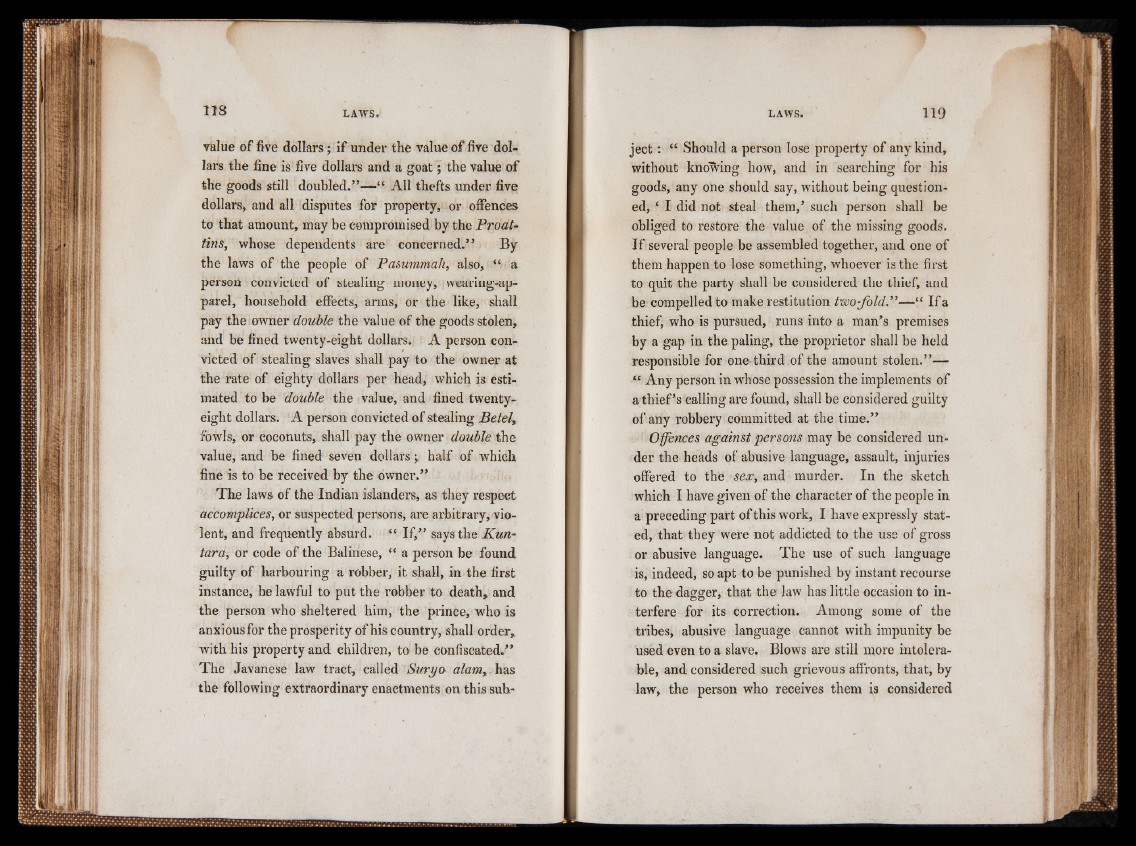
value of five dollars; if under the value of five dollars
the fine is five dollars and a goat; the value of
the goods still doubled.”—“ All thefts under five
dollars» and all disputes for property, or offences
to that amount, may be compromised by the ProaU
tins, whose dependents are concerned.” By
the laws of the people of Pasummah, also, “ a
person convicted of stealing money, wearing-ap-
parel, household effects, arms, or the like, shall
pay the owner double the value of the goods stolen,
and be fined twenty-eight dollars. A person convicted
of stealing slaves shall pay to the owner at
the rate of eighty dollars per head, which is estimated
to be double the value, and fined twenty-
eight dollars. A person convicted of stealing Betel,
fowls, or coconuts, shall pay the owner double the
value, and be fined seven dollars; half of which
fine is to be received by the owner.”
The laws of the Indian islanders, as they respect
accomplices, or suspected persons, are arbitrary, violent,
and frequently absurd. “ If,” says the Awn-
tara, or code of the Balinese, “ a person be found
guilty of harbouring a robber, it shall, in the first
instance, be lawful to put the robber to death, and
the person who sheltered him, the prince, who is
anxiousfor the prosperity of his country, shall order,
with his property and children, to be confiscated.”
The Javanese law tract, called Surya a lam, has
the following extraordinary enactments on this suhject:
“ Should a person lose property of any kind,
without knowing how, and in searching for his
goods, any one should say, without being questioned,
‘ I did not steal them/ such person shall be
obliged to restore the value of the missing goods.
If several people be assembled together, and one of
them happen to lose something, whoever is the first
to quit the party shall be considered the thief, and
be compelled to make restitution two-fold.”—“ If a
thief, who is pursued, runs into a man’s premises
by a gap in the paling, the proprietor shall be held
responsible for one-third of the amount stolen.”—
“ Any person in whose possession the implements of
a thief’s calling are found, shall be considered guilty
of any robbery committed at the time.”
Offences against persons may be considered under
the heads of abusive language, assault, injuries
offered to the sex, and murder. In the sketch
which I have given of the character of the people in
a preceding part of this work, I have expressly stated,
that they were not addicted to the use of gross
or abusive language. The use of such language
is, indeed, so apt to be punished by instant recourse
to the dagger, that the law has little occasion to interfere
for its correction. Among some of the
tribes, abusive language cannot with impunity be
used even to a slave. Blows are still more intolerable,
and considered such grievous affronts, that, by
law, the person who receives them is considered